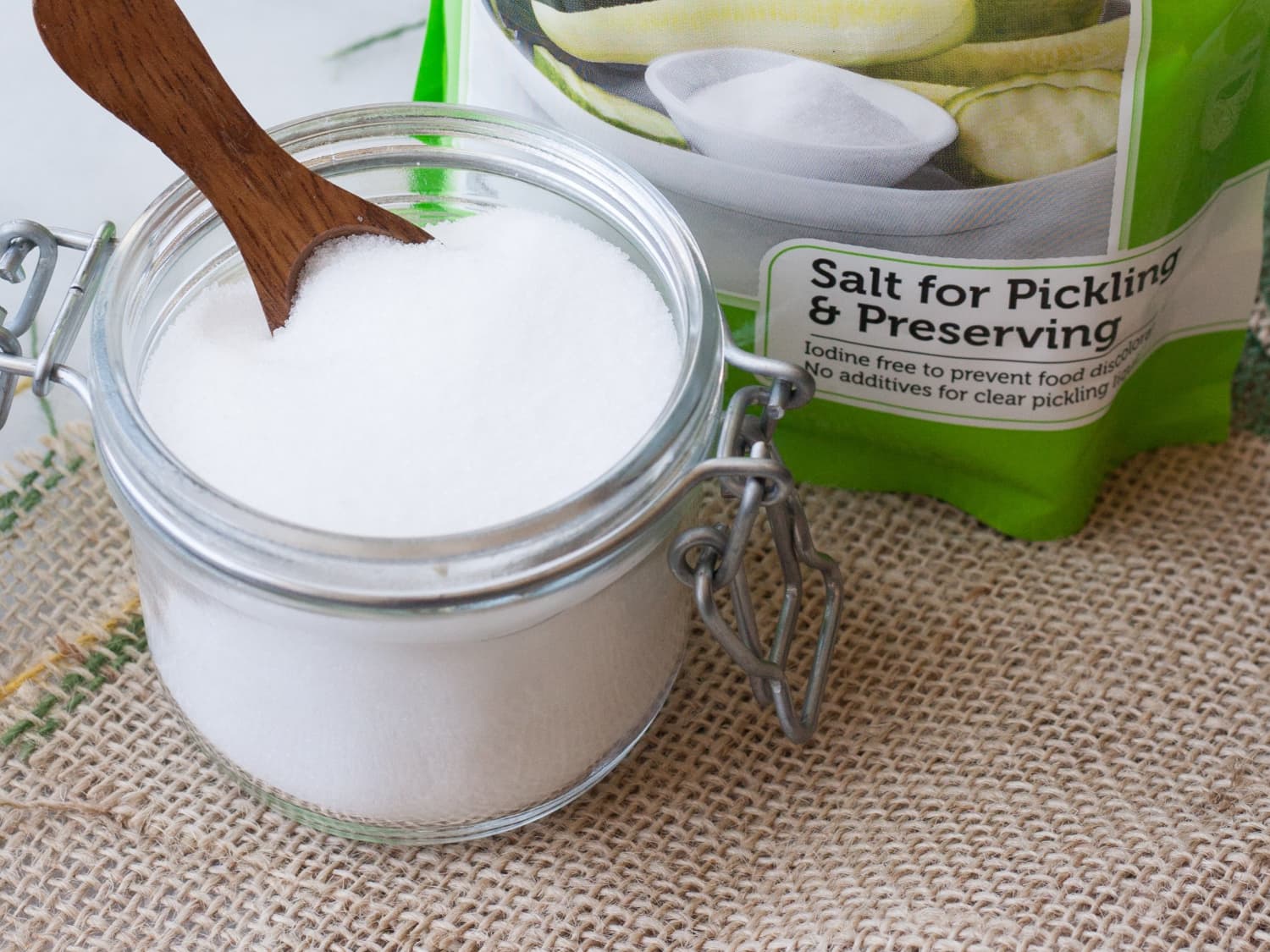
It is very flaky and adheres easily to food surfaces while coarse pickling salts only real difference from kosher salt is that some brands of kosher salt contain anti-caking additives while coarse pickling salt never contains these. Kosher salt grains have a large surface area.

In fact the pickling salt crystals are small uniform and smooth.
Difference between pickling salt and sea salt. Pickling salt is a very fine grained and quite pure salt. It doesnt contain iodine or anti-caking agents like table salt does. The fine grains let it dissolve quickly making it good for making brines for pickling.
Sea salt is salt. Pickling Salt vs Sea Salt. Sea salt can be used as a canning salt substitute because it contains no additives.
There are fine sea salts and coarse sea salts on the market so use this common conversion for accuracy. 1 tsp of pickling salt 1 tsp of fine sea salt. 12 cups of pickling salt 12 cup 2 teaspoons of fine sea salt.
There are two types of sea salt. Crystalline sea salt and flaked sea salt. Flaked salt is the more delicate and fast-dissolving of the two and is often used as a table salt.
Crystalline salt is available in fine or coarse grains and can be used for a variety of purposes including pickling. Its perfectly fine to use sea salt instead of. The difference between pickling salt and standard table salt is that pickling salt does not contain anti-caking ingredients.
Anti-caking ingredients found in salt prevent the salt granules from clumping together and or liquifying as easily in moist or humid conditions. Click to read full detail here. The one exception to this is kosher salt.
Is commonly interchanged with pickling salt because most are also pure salt with no additives or anti-caking agentsNote. A few brands of kosher salt DO have other ingredients so always check the label if you want a clear brine. It should only say salt and nothing else And if you can find a fine grain kosher salt all the.
Clockwise from top left. Kosher salt pickling salt table salt and sea salt. Andy LyonsMeredith Pickling salts pure form and fine texture makes it ideal for canning and preserving but one other form of salt can be used in its place in a pinch.
How does pickling salt differ from kosher salt. One of the most obvious differences between pickling and kosher salts is the size and shape of the particles. Pickling salt has small uniform granules with more or less regular shapes.
Kosher salt consists of larger irregularly shaped flakes. Kosher salt crystals are flatter than rather than the. Kosher salt grains have a large surface area.
It is very flaky and adheres easily to food surfaces while coarse pickling salts only real difference from kosher salt is that some brands of kosher salt contain anti-caking additives while coarse pickling salt never contains these. Click to see full answer. The main differences between sea salt and canning salt are processing taste and texture.
When it comes down to sea salt it is produced through the evaporation of water from saltwater lakes as well as the ocean water. There is little processing involved as well. Pickling or canning salt is a fine-grained salt used for processing pickles and for canning food.
As you prepare food to be canned or pickled this salt prevents the brine from getting cloudy. All the hard work of grinding up kosher or sea salt has been done. Pickling or canning salt is.
The biggest difference between pickling salt and Kosher salt is their salt crystal size. In fact the pickling salt crystals are small uniform and smooth. Meanwhile Kosher salt crystals are larger in size.
Pickle salt and kosher salt both have special uses. Canning salt is a great choice for the pickling process. A good substitute for pickling salt is kosher salt.
Its more widely available isnt particularly expensive and is also free of those additives that prevent clumping thanks to a comment from salt expert Mark Bitterman Ive learned that kosher salt can also contain those anti-caking agents. A level tablespoon weights 58 an ounce which is pretty darn close to the pickling salt. Sea salt can be used as a canning salt substitute because it contains no additives.
There are fine sea salts and coarse sea salts on the market so use this common conversion for accuracy. 1 tsp of pickling salt 1 tsp of fine sea salt. Kosher salt grains have a large surface area.
It is very flaky and adheres easily to food surfaces while coarse pickling salts only real difference from kosher salt is that some brands of kosher salt contain anti-caking additives while coarse pickling salt never contains these. It is a coarse salt that is light and flavorful and is used all over the country. There is another salt called pickling salt that is similar in appearance to kosher salt thus confusing people.
However despite ostensible similarities there are differences that will be enumerated in this article. The Upside to Difference between Canning Salt and Kosher Salt. Pickling salt is one particular example.
Its because of this that every salt is used for a different purpose though all of them have the very same chemical properties. Pure sea salt may also be utilised in pickling. Pickling salt is a type of salt that is primarily used in preserving food specifically pickles.
Like any other salts pickling salt also contains sodium and chloride but its chemical composition does not include iodine as one of its trace minerals. Pickling salt is the purest form of salt and is finely made into translucent grains. The difference between pickling salt and standard table salt is that pickling salt does not contain anti-caking ingredients.
Anti-caking ingredients found in salt prevent the salt granules from clumping together and or liquifying as easily in moist or humid conditions.